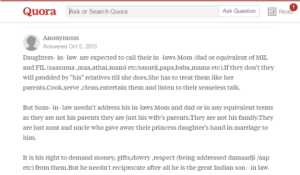A woman is expelled from her marital home and shunned by her neighbours for addressing in-laws by their name.
Malati Mahato lives in a tiny dwelling just outside a hamlet in Sundergarh district of Odisha. At first glance nothing seems to be amiss: she’s leading a quiet life amidst an idyllic, bucolic setting.But all is not what meets the eye--Malati has been cast outside her family and her village. She was ostracised on the orders of a kangaroo court which deemed her offence serious enough for such a strict punishment. Malati’s offence? She addressed her in-laws by their name.
Absolutely bizarre as it sounds, this is not out of the pages of a dystopian fantasy novel, but the reality of how women continue to be treated in the 21st century in India. Malati had incensed her sister-in-law when she made a reference to an elder male relative by his name. Her sister-in-law called a meeting of the village elders and asked for ‘justice’ for such behaviour. At the meeting it was unanimously decided that Malati must pay the price by completely severing all her ties with her marital family and the entire village. She was banished to a dwelling outside the village and the villagers were forbidden from communicating with her. Malati, despite this treatment meted to her, remains strong in her convictions: “I don’t think I did anything wrong,” she asserts.
But we should not make the mistake of dismissing this as a one-off incident from ‘backward’ rural India. Even in urban context women are not allowed to address their in-laws, sometimes husbands, directly. As a responses to a thread on the popular online forum Quora shows, there’s inequality written into women's experience:
[caption id="attachment_15100" align="alignleft" width="468"] Women aren't 'supposed' to call their husband and his family by their names[/caption]
Women aren't 'supposed' to call their husband and his family by their names[/caption]
Time and time again, incidents from across the country have repeatedly demonstrated that women’s rights are subservient to what is deemed culturally appropriate. Even the judiciary, supposedly an impartial arbiter, has repeatedly ruled in favour of patriarchal practices within the marriage. Bombay High Court acquitted a man charged with emotional abuse of his wife ruling that taunting her English accent, abusing her relatives or her cooking skills were part of “ordinary discord in matrimonial life”. That she subsequently committed suicide was chalked up to her “hyper-sensitivity”.
On the other hand, in another judgement the Supreme Court ruled that it was cruelty to ask a husband to separate from his family, noting that “[i]n normal circumstances, a wife is expected to be with the family of the husband after the marriage...In our opinion, normally, no husband would tolerate [a separate residence] and no son would like to be separated from his old parents and other family members.” The unquestioning acceptance that a son cannot be separated from his family, but a daughter must reveals the pernicious hierarchy inherent in patriarchy: women must submit to men, they will always be considered lesser.
“I didn't attend the meeting . They tried to pressurise my husband to drag me out of the house. It’s been one and half years now. No one in the village invites me to social functions or interacts with me.”
While the apex courts of the country are leading by dubious interpretations in favour of patriarchal mores, the power of kangaroo courts is also scary. Malati says: “I didn't attend the meeting . They tried to pressurise my husband to drag me out of the house. It’s been one and half years now. No one in the village invites me to social functions or interacts with me.” Bidesini Patel, the CC who was moved by Malati’s story to make a film about her has this to say about the incident,“This incident shows how we trample on women’s rights. I urge everyone to stop punishing women for addressing their husband and in-laws by their names.” The ban on taking names of in-laws to show respect is only symptomatic of the way we treat women overall in the country. The inferior position of women in the patriarchal setup is reflected through the unequal apportioning of rules to show respect to marital family while no such rules apply to the married men.
While the right to address someone by their name might seem like a ridiculously ineffective step to dismantle a behemoth like patriarchy, it is really the first step in realising how easily we accept and condone such customs. A ‘little thing’ like this has resulted in Malati having no home and no social support system. We’ll only succeed in creating equality when we stop treating such instances as aberrations and learn to see in them the pernicious continuum of patriarchal violence in our everyday lives.
THIS SERIES DOCUMENTING EVERYDAY PATRIARCHY IS SUPPORTED BY UNFPA | ARTICLE BY MADHURA CHAKRABORTY
Fixing India| Catching A Human Trafficker| Featuring Navita Devi|
Because of Navita's determination and bravery, a human trafficking agent is being the bars, and the girls have returned to their homes.This is how our CC’s are helping raise issues and finding solutions.
Self-Help groups unable to reach their potential
In Udaipur village of Harhua block of Varanasi district, the Mahalaxmi Self Help Group was formed 3 years ago, but they could not operate independently, because of the high handedness of the village head and the laxity of the Government officials.

